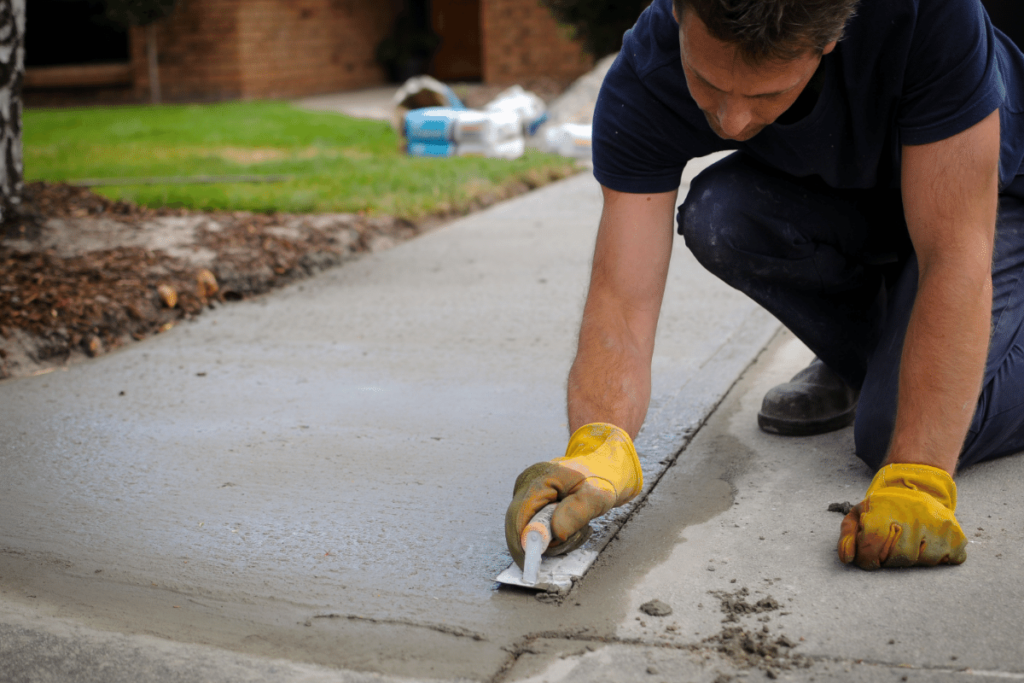Driveway Repair
Concrete vs. Asphalt Driveways: Choosing the Right Material for Your Home
Deciding between a concrete and an asphalt driveway involves weighing the advantages and disadvantages of each material. Here’s a detailed comparison by an pro concrete contractor to help you determine the best choice for your driveway needs.
Concrete Driveways:
Concrete is favored for its durability and low maintenance requirements. With proper care, a concrete driveway can last for decades. It doesn’t require frequent sealing or patching like asphalt, but it typically comes with a higher initial installation cost. Concrete also takes longer to cure, meaning there will be a longer wait time before you can use the driveway.
Advantages:
- Long-lasting
- Low maintenance
- Does not require frequent resurfacing
Disadvantages:
- Higher initial cost
- Longer curing time
Asphalt Driveways:
Asphalt is a cost-effective alternative, often chosen for its lower upfront cost and quick installation. However, it requires more maintenance over its lifespan, including resealing every few years, and typically needs replacing after 15-20 years. Asphalt is easier to repair if issues like cracks or potholes develop.
Advantages:
- Lower initial cost
- Quick installation
Disadvantages:
- Shorter lifespan
- Requires regular maintenance
Choosing the Right Material:
Your choice between concrete and asphalt will depend on your budget, how quickly you need the driveway ready, and your tolerance for ongoing maintenance. If longevity and minimal maintenance are priorities, concrete might be the way to go. If cost and quick installation are more critical, asphalt could be the better option.
Signs Your Driveway Needs Repair
Regardless of the material you choose, recognizing the signs of driveway distress is crucial for maintaining its condition and functionality. Here are indicators that your driveway may need repairs:
- Cracks: While small cracks might not be alarming, large or expanding cracks require prompt attention to prevent further deterioration.
- Flaking: If the surface of your concrete driveway is flaking or chipping, it suggests poor-quality concrete or improper installation.
- Sinking: Parts of your driveway may sink due to shifting soil underneath, possibly caused by tree roots, water damage, or natural settling.
- Weed Growth: Weeds or grass growing through cracks indicate that the cracks are widening and deepening.
- Potholes: These are immediate red flags that need filling or patching to restore the surface integrity.
- Uneven Surface: An uneven driveway can be hazardous and suggests significant shifting or settling of the concrete.
If you notice any of these issues, it’s advisable to consult a professional for a thorough assessment and appropriate repair solutions. Addressing problems early can help avoid more extensive and expensive repairs in the future.
Optimal Seasons for Concrete Driveway Repairs
When considering repairs for your concrete driveway, timing is crucial. Although repairs can be conducted at any time, winter is generally less suitable for extensive projects like resurfacing or adding new features such as stamped concrete or decorative borders. The cold weather can cause new concrete to crack and complicate achieving a smooth finish.
Spring and fall are ideal for undertaking repairs due to the mild and stable weather conditions. Summer also presents a good opportunity, although it’s essential to shield new concrete from extreme sunlight to prevent rapid drying and cracking. By choosing the right time for repairs, you can ensure the longevity and durability of your driveway.
Concrete Driveway Repair Services by TJ Concrete Centennial
Maintaining your concrete driveway in excellent condition is crucial not just for aesthetics but also for functionality. Over time, driveways can suffer from cracks, settling, and other forms of damage, necessitating prompt and effective repairs.
Our Repair Services Include:
- Concrete Patching and Filling: We address cracks and holes that can develop on your driveway’s surface, offering solutions like patching with new concrete or filling for a smoother finish and preventing further damage.
- Concrete Resurfacing: This involves applying a new concrete layer over the existing one, providing a fresh appearance and extending your driveway’s lifespan.
- Recoloring Concrete Surfaces: We can restore discolored and stained driveways to their original appearance with methods like pressure washing or sandblasting, followed by recoloring through painting, staining, or applying an epoxy coating.
- Sealing: To prevent water damage and protect against the elements, sealing fills in cracks and creates a protective barrier, enhancing the driveway’s durability.
- Slabjacking: For driveways that have sunk or settled unevenly, slabjacking is an effective method to lift and stabilize the concrete without the need for complete replacement.
Considerations and Costs
The cost for driveway repairs can vary widely, generally ranging from $1.10 to $4.50 per square foot, depending on the damage extent and repair scope. Smaller projects might be charged a flat rate. For an accurate estimate tailored to your specific needs, consulting with professional concrete contractors is advisable.
Choosing TJ Concrete Centennial ensures that you receive not only expert service but also guidance on maintaining your driveway to avoid future extensive repairs. Whether you need minor repairs or major renovations, our team is equipped to bring your driveway back to its best form, enhancing your home’s curb appeal and functionality.


